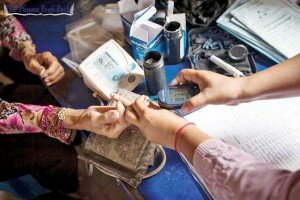
A woman has her blood sugar checked at a diabetes clinic in Phnom Penh.
06 September 2018
We are at a crossroads in Cambodia: cancer, cardiovascular diseases, diabetes and chronic respiratory diseases, the so-called ‘noncommunicable diseases’ (NCDs) are already the largest cause of mortality, and the rate is rising. They cause 61.3 percent of deaths but receive the least funding and attention across the board. People living with NCDs are also hit financially: they spend ten times as much on healthcare as those without NCDs. Clearly, huge action is needed to limit preventable deaths and work towards the goal of Universal Health Coverage (UHC).
Against this backdrop, a major new financial contribution of US$4.5 million has been committed to strengthen and expand NCD services nationwide. The investment, by German bank KfW, is the largest single investment in NCDs. It also provides an opportunity to reflect on where we are, overall, in the NCD response, and examine how this investment fits into the bigger picture of what still needs to be done.
NCDs impose a significant financial burden on households in Cambodia. For people living with an NCD, out-of-pocket expenditure on health accounts for about a third of their monthly income, compared to only 3 percent of income for people without an NCD. This results in catastrophic health expenditure.
Efforts to achieve the UHC agenda – ensuring access to quality health services without financial hardship – are gaining some momentum in Cambodia, with clear policies to expand financial protection through social health protection schemes and reduce financial barriers to access. Addressing NCDs is a crucial part of delivering UHC, but without a balance between the upstream, multisectoral policies for prevention, and the downstream, health-sector interventions to improve access to quality health services, efforts will have limited success.
GIZ Cambodia’s Social Health Protection Program is a key partner in the NCD response, providing financial and technical support to the Ministry of Health’s Preventive Medicine Department (PMD). PMD have established basic screening and treatment services for hypertension and diabetes in a small number of health centers, based on the WHO Package of Essential NCD services (PEN). Financial support is provided by GIZ to implement PEN in 11 health centers in Kampong Thom and Kampot provinces.
Since 2007, 26 NCD clinics have also been established, at district and provincial referral hospitals, to treat more complicated cases. However, these services are currently not adequate for the scale of the burden in Cambodia.
The US$4.5 million, committed by KfW to the Cambodian Health Equity and Quality Improvement Project (H-EQIP) will support supply-side readiness and the availability of key NCD services, specifically cervical cancer, hypertension, and diabetes screening and treatment services. This funding is particularly significant considering the extremely small global NCD investment: a mere 1.3 percent of total Development Assistance for Health (DAH).
Funding for NCDs is rare: globally NCDs account for 70 percent of health-related deaths but receive less than 1.3 percent of development assistance of global health budgets. This investment is an opportunity to build new momentum and commitment to NCDs in Cambodia.
GIZ will continue to support the MOH’s Preventive Medicine Department, who will be the lead implementing body responsible for scaling up NCD services. NCD service delivery is also the focus of two further projects launching in 2018, funded by Novo Nordisk, in collaboration with GIZ and PMD. This includes a 3-year project ‘Changing Diabetes in Children’ (CDiC) and a 1-year project ‘Changing Diabetes in Adults’ (CDiA). CDiC aims to improve access to care for children and young people with type 1 diabetes and CDiA will strengthen the capacity and infrastructure of the existing NCD clinics.
Other key developments this year include the endorsement of the Multisectoral Action Plan on NCDs by the Cambodian Prime Minister, setting the tone for a whole-of-government response; new data on the prevalence of NCD risk factors (STEPS Survey 2016); and joint UNDP-WHO NCD investment case, currently underway, which will provide the economic case for investing in the prevention and control of NCDs.
Significant investment to strengthen services for those most at-risk is of course necessary, but simply treating our way out of the NCD epidemic is not an option. The new investments of 2018 should be celebrated and leveraged to build greater momentum for action. We are at a critical point. New alliances need to be formed, accountability strengthened, and the narratives must speak the language of decision-makers. Ultimately, a whole-of-government and whole-of-society approach is needed to reverse current trends.
Charlotte Aberdein (GIZ SHPP)
Data Protection
Disclaimer
